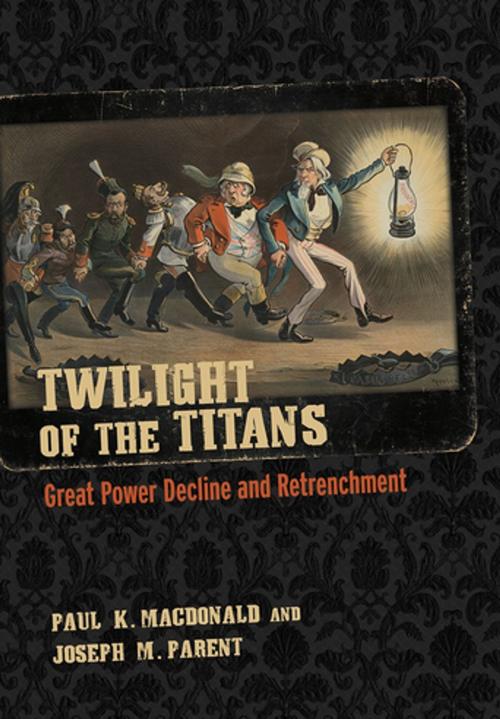Twilight of the Titans
Great Power Decline and Retrenchment
Nonfiction, Social & Cultural Studies, Political Science, International, International Security, International Relations| Author: | Paul K. MacDonald, Joseph M. Parent | ISBN: | 9781501717116 |
| Publisher: | Cornell University Press | Publication: | April 15, 2018 |
| Imprint: | Cornell University Press | Language: | English |
| Author: | Paul K. MacDonald, Joseph M. Parent |
| ISBN: | 9781501717116 |
| Publisher: | Cornell University Press |
| Publication: | April 15, 2018 |
| Imprint: | Cornell University Press |
| Language: | English |
In this bold new perspective on the United States–China power transition, Paul K. MacDonald and Joseph M. Parent examine all great power transitions since 1870. They find that declining and rising powers have strong incentives to moderate their behavior at moments when the hierarchy of great powers is shifting. How do great powers respond to decline? they ask. What options do great powers have to slow or reverse their descent?
In Twilight of the Titans, MacDonald and Parent challenge claims that policymakers for great powers, unwilling to manage decline through moderation, will be pushed to extreme measures. Tough talk, intimidation, provocation, and preventive war, they write, are not the only alternatives to defeat. Surprisingly, retrenchment tends not to make declining states tempting prey for other states nor does it promote domestic dysfunction. What retrenchment does encourage is resurrection. Only states that retrench have recovered their former position.
MacDonald and Parent show how declining states tend to behave, what policy options they have to choose from, how rising states respond to decline, and what conditions reward which strategies. Using case studies that include Great Britain in 1872 and 1908, Russia in 1888 and 1903, and France in 1893 and 1924, Twilight of the Titans offers clear evidence that declining powers have a wide array of options at their disposal and offers guidance on how to use the right tools at the right time. The result is a comprehensive rethinking of power transition and hegemonic war theories and a different approach to the policy problems that declining states face. What matters most, the authors write, is the strategic choices made by the great powers.
In this bold new perspective on the United States–China power transition, Paul K. MacDonald and Joseph M. Parent examine all great power transitions since 1870. They find that declining and rising powers have strong incentives to moderate their behavior at moments when the hierarchy of great powers is shifting. How do great powers respond to decline? they ask. What options do great powers have to slow or reverse their descent?
In Twilight of the Titans, MacDonald and Parent challenge claims that policymakers for great powers, unwilling to manage decline through moderation, will be pushed to extreme measures. Tough talk, intimidation, provocation, and preventive war, they write, are not the only alternatives to defeat. Surprisingly, retrenchment tends not to make declining states tempting prey for other states nor does it promote domestic dysfunction. What retrenchment does encourage is resurrection. Only states that retrench have recovered their former position.
MacDonald and Parent show how declining states tend to behave, what policy options they have to choose from, how rising states respond to decline, and what conditions reward which strategies. Using case studies that include Great Britain in 1872 and 1908, Russia in 1888 and 1903, and France in 1893 and 1924, Twilight of the Titans offers clear evidence that declining powers have a wide array of options at their disposal and offers guidance on how to use the right tools at the right time. The result is a comprehensive rethinking of power transition and hegemonic war theories and a different approach to the policy problems that declining states face. What matters most, the authors write, is the strategic choices made by the great powers.















